THE EGYPTIAN PROBLEM
1VE do not say that the Egyptian situation is critical, but without question it is very difficult, and there are elements in it which cannot but give rise to grave anxieties.
It must not be supposed, however, that Great Britain has no resources for protecting her intimate and peculiar status in Egypt, or that the results of the recent elections compromise her rights and duties under the new Con- stitution. Nothing is cancelled of those obligations and Treaties by which Egypt as a political entity is bound to all the chief European Powers, including in a special degree Great Britain. These Treaties in effect create an " overhead " constitution in the fields of Finance, Justice, External Relations, and the British Protectorate. Moreover, there are the British Proclamations and Declarations under which our relations with Egypt are clearly indicated, the nature of our Protectorate is defined, and the separation and differentiation of our position in the Sudan are made clear. The Sudan is, in fact if not in name, part of the British Empire. Lord Cromer had a wise and discerning care in this matter when, under his inspiration, Great Britain after over- throwing the Khalifa took possession of the lands which he had so cruelly oppressed. In the first place, Lord Cromer refused absolutely to allow Internationalism and all its complications to enter the Sudan. The Mixed Tribunal stopped dead at Wady Halfa. Again, he marked the fact that the Sudan was not a portion of a Protected State, but had a status of her own, through the symbolism of the British flag. The Sudan, redeemed from a savage slavery by British force and influence, was not reconstituted as an Egyptian province, and our indefeasible rights—greatly to the satisfaction of the inhabitants =were firmly established. We..haye. also to remember the fact of the " occupa- tion," as the French, with their love of abstractions and personifications, were in the 'eighties and 'nineties wont to speak of our regime. The occupation of Upper and Lower Egypt, the Canal zone and the Sudan does not signify a fortuitous concourse, of military atoms, but has definite sanctions, internal and external, and bestows on us rights as well as duties. Lord Cromer, who was no friend of over-subtle political and con- stitutional devices, never made any concealment of the fact that the " Army of Occupation " was in the last resort our warrant—a warrant not only not challenged by the Powers but endorsed by express words or else by an equally significant acquiescence. , , , All these matters must be carefully considered by those who wish to understand the Egyptian crisis and to estimate its effects. People are inclined to talk as though the recent elections, and the plebiscitary mandate apparently thereby accorded to Zaghlul, were a kind of " notice to quit " to the British—" Having agreed to the Constitution and acquiesced in the new electoral laws, are we not obliged to abide by the decision given at the polls ? " The very question is based on a mistake.
The elections do not, and cannot, affect either our rights and duties, or even those of the Egyptian Sultan. Still less can they alter or affect the Capitulations, or the Treaties and International Statutes and Protocols, under which the Mixed Tribunal works, the Finance is administered, and the Suez Canal Company carries on its operations. Rightly or wrongly, Egypt is not in any strict sense a Sovereign State, and no action by her Parliament can alter this imperative circumstance.
We have a valuable asset in Lord Lloyd. If he handles the crisis as we fully expect he will, Zaghlul will find that, though the elections are, no doubt, an important fact, they do not in any way give the triumphant party a mandate to turn the British out of Egypt or to revolu- tionize the Egyptian State and Constitution. It may perhaps be suggested that all this is foolish optimism—" What are you going to do if the whole of Egypt, from the Second Cataract to the mouths of the Nile, breaks into flame ? " The answer, of course, is that we shall continue to preserve order. Nothing could more quickly or effectively defeat the aims of Zaghlul and his followers than an appeal by them, direct or indirect, to physical force. An ineffectual insurrection—and ineffectual it certainly would be-- could lead only to a reaction among the middle classes who now partly share and inflate the aspirations of the extremists. Further, it would consolidate in our favour the large population of non-Egyptian origin— Greeks, Italians, Frenchmen, Germans, Armenians, Slays, Levantines and Jews—who live under the Capitulations.
We must never forget that, though the Egyptians dislike us and our presence in their country, many of them realize that to get rid of us would be to go from bad to worse. If we were to tire of perpetual pinpricks and, after securing our hold on the Canal and the Sudan, were to leave Egypt to her fate, that fate could hardly fail to be unpleasant to the inhabitants, who have flourished under our regime. Egypt is aware, though it is forgotten here, that the African possessions of Italy stretch on both sides of her. Cyrenaica, indeed, " marches " for many hundreds of miles with the Libyan frontier of Egypt. But we need say no more on that point, for even the wildest of Egyptian patriots realizes that an Italian Dictator, if he entered Cairo " to restore law and order and protect the white Nationals of all races," would inaugurate a very different reg.:me from that of the British.
On all these grounds we not only hope,. but believe, that the crisis will turn out to be capable of arrangement. To be specific, if Zaghlul becomes Prime Minister it will be on terms. -










































 Previous page
Previous page